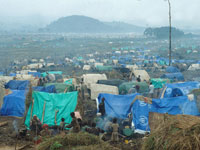Iraqi refugees to return home from Syria
The violence in Iraq ebbs. The country's embassy in Syria starts to organize free trips for Iraqis who want to return home.

Free convoys and even airplane tickets out are part of a new push by the Baghdad authorities to reach out to Iraqi refugees in Syria who want to go back, said Adnan al-Shourifi, the commercial secretary at the Iraqi embassy in Damascus.
Al-Shourifi told The Associated Press that the first free trip is scheduled for Monday, when a convoy of buses and an Iraqi Airways flight will ferry the refugees home to Iraq.
At al-Shourifi's downtown Damascus office, an announcement from the Iraqi transport ministry calls on Iraqis "wishing to return to Iraq to register" for the Nov. 26 bus or flight. It says the move follows instructions from Iraqi Prime Minister Nouri al-Maliki.
The diplomat did not say how many Iraqis have registered or plan to go back but the number is expected to be in the hundreds. Eleven registration centers have been set up in Damascus to receive Iraqis who want to apply for the trip home, al-Shourifi said, adding that the government will arrange additional trips.
Thousands of Iraqis living in Syria have headed back home in the past weeks.
The move was attributed mostly to Damascus imposing harsh visa requirements since last month that make it more difficult for Iraqis to stay here, but also in part to the improved security situation at home.
Syria has the highest number of Iraqi refugees in the region - estimated to be about 1.5 million Iraqis - and says their influx has strained its education, health and housing systems, pushing the government to tighten visa requirements and to call for international assistance.
Damascus has said the cost of the Iraqi refugees' stay in Syria is estimated at US$1.6 billion (€1.07 billion) a year.
Now that calm has returned to some areas of Iraq, Iraqi refugees in Syria should go home "to rebuild Iraq and to ease burdens on Syria," said Rushdie al-Ani, a representative of Vice President Tariq al-Hashimi's Iraqi Islamic Party, told The AP in Damascus.
And even though the streets of Baghdad are still not entirely safe, people are venturing more out of their homes.
The U.S. military says attacks across the country have fallen to their lowest level since February 2006, attributing this partly to a surge of nearly 30,000 troops earlier this year.
Also, in recent months, many Sunni Iraqi fighters from Islamic insurgent groups turned against al-Qaida and are cooperating with U.S. and Iraqi forces in driving extremists out of their neighborhoods and villages.
many Iraqi refugees in Syria seemed to welcome the call to go back.
Khaled Mohammad, 42, from the once insurgent-ridden Anbar provincial capital of Ramadi, has been living for months in the area of Jdaydet Artouz near Damascus. He now says he will return on his own, and take his family back with him.
"The situation in Iraqi, as I have learnt from my relatives there, is now much better," Mohammad said.
He said some 900 Iraqis, who were living in Jdaydet Artouz, have already gone back and only 100 Iraqis remain there.
But others hesitate.
Lutfi Subhi, 70, from Baghdad, who has been living in al-Sayda Zeinab in southern Damascus for two years, said he will return once he feels "secure."
Another Iraqi diplomat, speaking on condition of anonymity because he was not authorized to release the information, said Iraq's Finance Minister Bayan Jabr is expected in Damascus on Thursday with a US$15 million (€10.1 million) in aid to assist the Syrian government in helping Iraqi refugees.
Subscribe to Pravda.Ru Telegram channel, Facebook, RSS!





